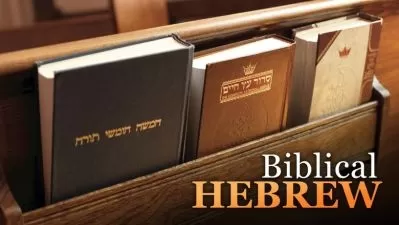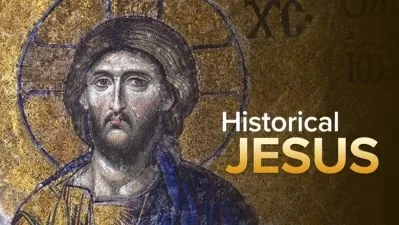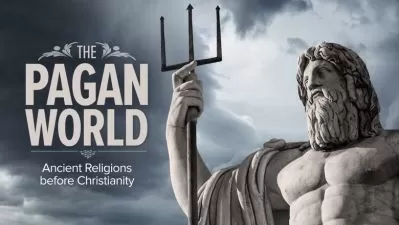Jesus and His Jewish Influences
Jodi Magness
12:12:51
Description
For anyone interested in understanding the profound effect Jesus had on the world, it’s important to realize that his actions and teachings didn’t emerge from a vacuum. Rather, they were the product of a fascinating dialogue with—and reaction to—the traditions, cultures, and historical developments of ancient Jewish beliefs. In fact, early Judaism and Jesus are two subjects so inextricably linked that one cannot arrive at a true understanding of Jesus without understanding the time in which he lived and taught.
In search of a more complete comprehension of Jesus’s legacy, this course explores fundamental questions such as:
How was early Judaism markedly different from the Rabbinic Judaism practiced today?
What kind of world did early Jewish sects envision, and how does Jesus’s world view relate to theirs?
How did events like the Babylonian exile and the reign of Herod the Great affect the development of Judaism up to Jesus’s time?
What did it really mean to be a Jew in ancient Israel—and what did it mean for Jesus?
Answers to these and other thought-provoking questions about ancient Judaism and the roots of Jesus’s ministry can be found in the 24 intriguing lectures of Jesus and His Jewish Influences. Crafted by acclaimed archaeologist and biblical scholar Jodi Magness of The University of North Carolina at Chapel Hill, this fascinating course approaches the subject of Jesus from a historical, rather than scriptural, perspective; one rooted in the study of ancient texts and archaeological discoveries. You’ll embark upon an in-depth investigation of the ancient world that Jesus was born into, and you’ll revisit the tumultuous events of early Jewish history with the specific purpose of gleaning hidden insights into how they shaped an individual—and a movement—whose legacy endures to this very day.
Learn How Ancient Israel Gave Rise to Jesus
Instead of focusing on historically authenticating the Gospel accounts of Jesus’s sayings and activities, Jesus and His Jewish Influences is interested in exploring how the Gospel accounts are better understood through the lens of early Judaism. To this end, Professor Magness’s lectures are a veritable survey of some of the most defining moments in ancient Israel, from the establishment of Mosaic Law to the destruction of the Second Temple by the Romans in 70 A.D. These include:
- The destruction of Solomon’s Temple: In 586 B.C., the Kingdom of Judah fell to the Babylonians, and Solomon’s Temple was destroyed. Signaling the end of the First Temple Period, this traumatic event was drawn upon later by the Gospel authors as a way to illustrate Jesus’s foreshadowing of the destruction of the Second Temple in 70 A.D.
- The Babylonian exile: After the conquest of the Kingdom of Judah, the inhabitants were forced into exile. The exile ended in 539 B.C. after the Persian king Cyrus allowed the exiled Jews return to Jerusalem and rebuild their temple. This return, however, led to a powerful schism between the Jews and Samaritans—one reflected in Gospel parables about Samaritans.
- The Maccabean Revolt: When Judaism was outlawed under the orders of Antiochus IV, a priestly clan named the Maccabees (or Hasmoneans) led a revolt in 167 B.C. to oppose this new reality. Lasting for years, the revolt was a reaction to Antiochus IV’s edict outlawing Judaism and rededicating the Jerusalem temple to the worship of Olympian Zeus. The rise of the Maccabean Kingdom also provides interesting context for understanding the Gospel birth narratives about Jesus.
Along the way, you’ll encounter a fascinating range of early Jewish sects, including the Pharisees, Sadducees, and Essenes. You’ll also meet some of the predecessors and contemporaries of Jesus who played a pivotal role in shaping or recording the world Jesus was born into, such as
- Herod the Great, the tyrannical and murderous ruler of Judea infamous for the (historically questionable) Massacre of the Innocents;
- Flavius Josephus, the ancient historian whose writings complement the works of the Gospel authors and who offers first-hand accounts of events during the time of Jesus and afterwards;
- King Josiah, the ruler of Judea loved by the biblical writers (and described in glowing terms) for his religious reforms asserting the centrality of the Jerusalem Temple and its priesthood.
Draw Illuminating Connections between Jesus and Judaism
At the heart of these lectures are eye-opening, illuminating insights into the numerous historical connections between Jesus and the story of early Judaism. You’ll see firsthand how this background provides a deeper, more well-rounded context for understanding Gospel accounts of Jesus’s life and ministry—and, conversely, the Gospels themselves provide valuable information about how Judaism was lived and practiced in Jesus’s time.
Here are just a few of the many connections you’ll make in Jesus and His Jewish Influences:
- Schismatic Samaritans: The historic schism between the Jews and Samaritans after the Babylonian exile can be found hidden within the popular parable of the Good Samaritan. The story itself puts a strange spin on the person who comes out looking good (the Samaritan) considering that Samaritans were, in the eyes of Jews during the time of Jesus, schismatics.
- Golden rules: The passage in Matthew that recounts Jesus’s “golden rule” illustrates a broad disagreement among early Jews about whether or not to love one’s enemies. Jesus’s views about loving everyone (and healing the sick) stem not from pure kindness alone but from his view of holiness—that one can only enter the Kingdom of Heaven by emulating God’s perfection.
- Political executions: Why was James, the brother of Jesus, not crucified but stoned to death? The answer is that he was charged with violating Jewish law, unlike Jesus, who was executed by the Romans on a charge of treason. James’s execution by the Sanhedrin (on possibly trumped-up charges) reflects the early hostility of elite Jews toward the proto-Christians.
- Mountaintop revelations: What makes the episode of the Sermon on the Mount so interesting is its clear connection with Moses’s revelation of the law on Mount Sinai. Both revelations take place on sacred mountaintops, and both involve the establishment of new laws meant to guide an entire people
Get a Fresh Look at the Origins of History’s Most Influential Figure
Throughout the course, Professor Magness speaks directly from her hands-on experience as a classical archaeologist digging in Israel and her depth of knowledge as a scholar of early Judaism. The winner of numerous teaching awards and honors, she’s spent her entire career immersed in the rich history of the ancient Holy Land, making her the perfect professor for a course designed to place Jesus within his contemporary socio-political environs.
Every lecture of Jesus and His Jewish Influences draws on a wealth of excerpts and passages from some of the most important and influential texts ever written, including:
- the Hebrew Bible
- the New Testament (specifically the four canonical Gospels)
- the Apocrypha (“hidden works”) and Pseudepigrapha (“false writings”)
- historical accounts, including Josephus’s The Jewish War
- the Dead Sea Scrolls
What made Jesus Jesus? How did his life and teachings reflect his Jewish roots—and break away from them? Prepare for a fresh look at Jesus that will bring you closer than ever to the dawn of a spiritual figure—and revolution—that would change the world.
More details
User Reviews
Rating
Jodi Magness
Instructor's CoursesDr. Jodi Magness is the Kenan Distinguished Professor for Teaching Excellence in Early Judaism in the Department of Religious Studies at The University of North Carolina at Chapel Hill. She earned her B.A. in Archaeology and History from The Hebrew University of Jerusalem and her Ph.D. in Classical Archaeology from the University of Pennsylvania. For her engaging teaching, Professor Magness won the Archaeological Institute of America's Award for Excellence in Undergraduate Teaching. Her other honors include a Fulbright Lecturing Award from the United States-Israel Educational Foundation, and fellowships from institutions including the American Council of Learned Societies and the National Endowment for the Humanities. A trained archaeologist with more than 20 years of field experience, Professor Magness has excavated throughout Israel and in Greece and has codirected excavations of the Roman siege works at Masada and a Roman fort at Yotvata. She is the author of numerous scholarly books on the archaeology of the Holy Land. Among them are The Archaeology of Qumran and the Dead Sea Scrolls, which won the 2003 Biblical Archaeology Society's Award for Best Popular Book in Archaeology, and The Archaeology of the Early Islamic Settlement in Palestine, which won the Irene Levi-Sala Book Prize.

The Great Courses
View courses The Great Courses- language english
- Training sessions 24
- duration 12:12:51
- English subtitles has
- Release Date 2023/06/06











